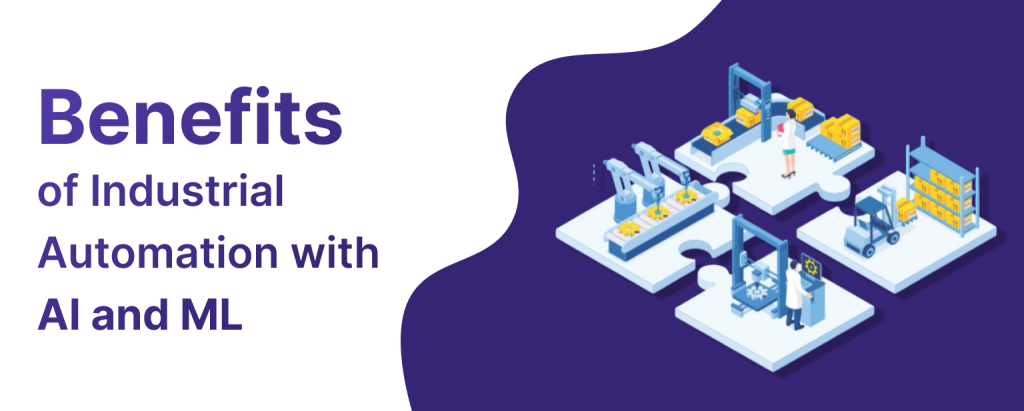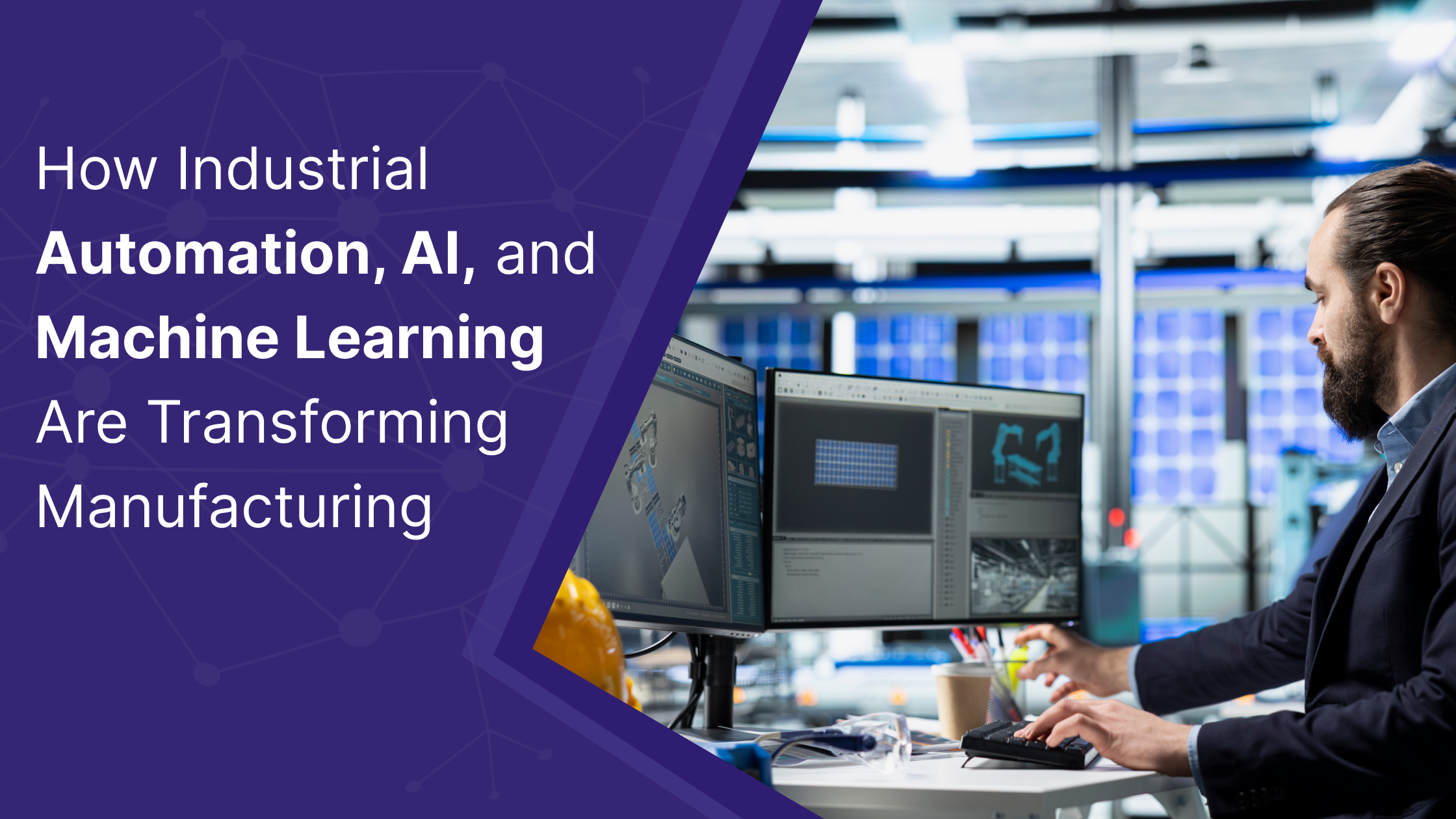Summary:
Industrial automation, powered by AI and machine learning, is revolutionizing the manufacturing industry. From predictive maintenance and quality control to optimized production lines and smart supply chains, these technologies enhance efficiency, reduce costs, and enable data-driven decision-making. This blog explores real-world applications, benefits, challenges, and future trends of industrial automation in modern manufacturing.
The manufacturing industry is evolving faster than ever, driven by technological advancements. Industrial automation, powered by AI and machine learning (ML), is no longer a futuristic concept it’s a necessity for businesses aiming to enhance efficiency, reduce costs, and stay competitive.
From automated production lines to smart factories, manufacturers are leveraging industrial automation to streamline operations, predict maintenance needs, optimize supply chains, and improve product quality. This article explores how industrial automation, AI, and ML are revolutionizing manufacturing, offering real-world applications, benefits, challenges, and future trends.
1. Understanding Industrial Automation in Manufacturing
Key Applications of Industrial Automation:
Industrial automation refers to using control systems, robots, and software to perform manufacturing tasks with minimal human intervention. Automation helps increase productivity, reduce human error, and improve operational safety.
- Automated Production Lines: Robotics handle assembly, packaging, and material handling tasks efficiently.
- Process Control Systems: Sensors and software monitor production conditions, ensuring consistent quality.
- Energy Management: Automated systems optimize energy usage and reduce operational costs.
- Inventory and Warehouse Automation: Automated guided vehicles (AGVs) and robotic storage systems streamline logistics.
Industrial automation creates a foundation for smarter factories where AI and ML can further enhance decision-making and efficiency.
2. Role of AI in Industrial Automation
Artificial Intelligence enhances automation by enabling machines to make intelligent decisions based on data. When combined with industrial automation, AI allows manufacturers to achieve predictive, adaptive, and efficient operations.
AI Applications in Industrial Automation:
- Predictive Maintenance: AI predicts equipment failures before they occur, reducing unplanned downtime.
- Quality Assurance: AI-powered vision systems detect defects in real-time for consistent product quality.
- Production Optimization: AI analyzes real-time data to optimize workflow and resource allocation.
- Supply Chain Forecasting: AI helps anticipate demand, manage inventory, and prevent bottlenecks.
By integrating AI with industrial automation, manufacturers can move from reactive to proactive operations, saving time and costs while improving efficiency.
3. Machine Learning in Manufacturing Automation
Machine Learning, a subset of AI, allows systems to learn from data and improve over time without explicit programming. ML enhances industrial automation by providing predictive insights and process optimization.
ML Use Cases in Industrial Automation:
- Demand Forecasting: ML predicts market trends and customer demand, enabling better production planning.
- Predictive Analytics for Equipment: ML models analyze machine data to foresee potential failures.
- Process Improvement: ML identifies patterns in production inefficiencies and recommends solutions.
- Risk Management: ML anticipates supply chain disruptions and operational risks, allowing timely interventions.
With ML, manufacturers can continuously refine processes, reduce waste, and increase throughput.
4. Benefits of Industrial Automation with AI and ML

Adopting industrial automation, supported by AI and ML, provides tangible advantages:
- Enhanced Productivity: Automated systems streamline repetitive tasks and accelerate production.
- Cost Reduction: Predictive maintenance, energy optimization, and reduced labor costs lower operational expenses.
- Improved Product Quality: AI-driven inspections and automation ensure consistent quality standards.
- Faster Time-to-Market: Automated production lines speed up manufacturing cycles.
- Data-Driven Decisions: AI and ML analyze operational data to inform strategic business decisions.
- Safety and Compliance: Automation reduces workplace accidents and ensures adherence to regulatory standards.
5. Challenges in Implementing Industrial Automation
Despite its advantages, industrial automation comes with certain challenges:
- High Initial Investment: Implementing automation and AI/ML solutions requires capital expenditure.
- Skilled Workforce Requirements: Companies need trained professionals to manage and maintain automated systems.
- Data Management: Effective AI and ML applications require large volumes of high-quality data.
- Integration with Legacy Systems: Older machinery may not be compatible with advanced automation technologies.
Overcoming these challenges involves careful planning, staff training, and selecting scalable, future-ready solutions.
6. Real-World Examples of Industrial Automation
- Siemens: Uses AI-powered predictive maintenance in automated factories to reduce downtime and improve efficiency.
- Tesla: Fully automated assembly lines utilize robotics for precision manufacturing and inspection.
- General Electric (GE): Implements ML-driven production planning and supply chain optimization.
These examples highlight how industrial automation, coupled with AI and ML, can drive measurable improvements in efficiency, cost savings, and quality.
7. The Future of Industrial Automation in Manufacturing
The next phase of industrial automation is intelligent, fully connected factories. Key emerging trends include:
- Digital Twins: Virtual replicas of physical assets to simulate and optimize performance.
- Edge Computing: Real-time data processing at the source to enable faster insights.
- Collaborative Robots (Cobots): Robots that work alongside humans to enhance productivity and safety.
- AI-Driven Supply Networks: Automated, adaptive supply chains managed through AI algorithms.
Manufacturers adopting these technologies will gain agility, scalability, and a competitive edge in a fast-changing market.
Conclusion
Industrial automation, powered by AI and ML, is no longer a luxury it’s essential for modern manufacturing. From predictive maintenance and quality control to optimized production and smart supply chains, these technologies drive efficiency, reduce costs, and enable data-driven growth.
At Diginnovators, we help manufacturing companies implement industrial automation solutions that deliver measurable results. Our expertise in AI, ML, and automation transforms operational data into actionable insights, powering smarter, safer, and more efficient factories.







